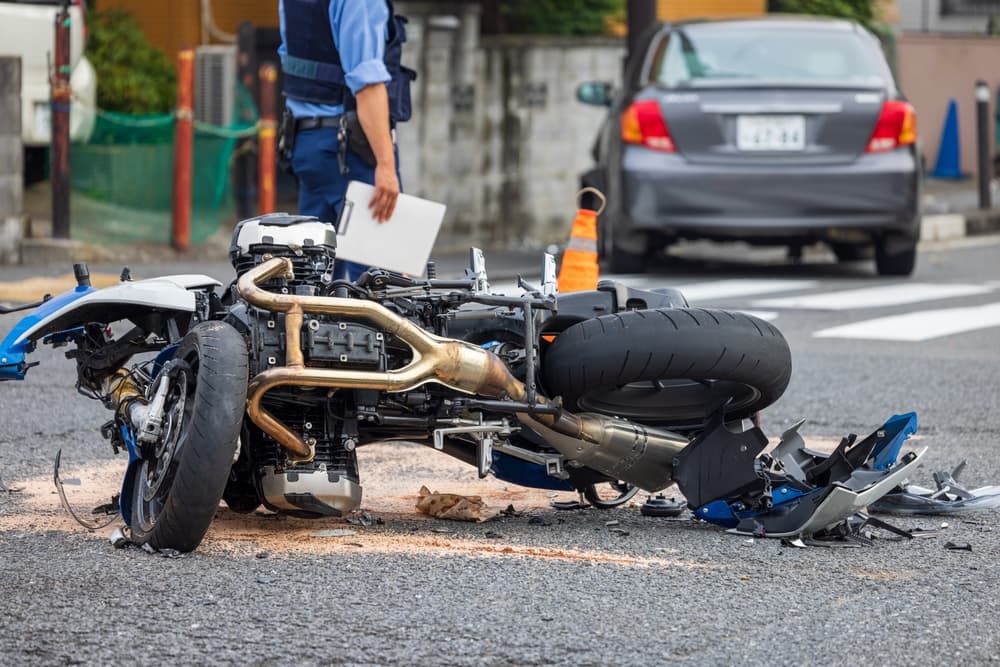The presence or absence of a motorcycle helmet should not fundamentally impact the outcome of your motorcycle accident case. In the event that another motorist is responsible for the collision, you have the right to hold them financially accountable for any damages you incur, whether or not you were wearing a helmet.
However, it's important to note that insurance companies and at-fault parties may attempt to leverage a motorcyclist's decision not to wear a helmet as a factor against them. A skilled motorcycle accident attorney in Myrtle Beach will skillfully counter any unfounded arguments suggesting that your compensation rights are waived due to the absence of a helmet.
Suppose you find yourself in a situation where someone else's actions caused your motorcycle accident. In that case, you are entitled to fair compensation – it's as straightforward as that.
Why You Might Still Qualify for Compensation Even Without a Motorcycle Helmet

The absence of a helmet, assuming you weren't wearing one, shouldn't automatically disqualify you from receiving compensation for your motorcycle accident. The potential impact on the compensation amount is minimal for several reasons:
Helmets Are Not Universally Mandated
Motorcycle helmet regulations vary across states, with many allowing riders above a certain age (typically 17, 18, or 20) to decide whether to wear a helmet. If your state grants this choice, your decision to ride without a helmet shouldn't negate your right to compensation.
Helmets Don't Guarantee Injury Prevention
While helmets are effective in reducing certain injuries, they don't provide absolute protection. Various severe injuries, such as neck injury, spinal cord injury (SCI), broken bones, internal injuries below the neck, scarring below the neck, and amputation injuries, may occur irrespective of helmet use.
Not Relevant in Certain Injury Cases
When seeking compensation for specific injuries, such as a broken arm, the use or non-use of a helmet becomes logically irrelevant. There's no valid reason for a defendant to bring up helmet use in cases where the injury is unrelated to the protective gear. However, insurance companies may try.
Establishing Helmet Effectiveness Is the Responsibility of the Liable Parties
While a helmet might have been beneficial in preventing a skull fracture, it's the defendant's (liable party) responsibility in your case to prove this claim.
Presenting this argument involves reconstructing complex details such as:
- The precise angle of impact from the vehicle
- The exact speed at which the collision occurred
- The specific manner in which you came into contact with the ground or other stationary objects
Recreating these circumstances is quite a challenge for liable parties.
The Relevance of Helmet Use Pales in Comparison to the Issue of Negligence
The question of whether you wore a helmet may carry limited significance. Even if it does, it's considerably less important than the crucial question: Who is responsible for the accident?
If someone else is at fault, they should bear the majority of the financial responsibility for your accident-related damages. While the defendant may argue that the absence of a helmet exacerbated your injuries, the fundamental truth remains – without the defendant's negligence, discussing injuries would be unnecessary.
Legal Protections Against Mentioning Helmet Use in Some States
Certain states prohibit defendants from bringing up a rider's helmet use during legal proceedings. While numerous states permit insurance companies or other defendants to reference a rider's decision not to wear a helmet, some states disallow it. Consequently, liable parties may be barred from introducing the helmet issue, rendering their attempts to diminish your settlement or judgment inconsequential.
A Lawyer Protects You from Attempts to Exploit Your Lack of a Helmet
When the matter of your helmet use becomes a focal point in an insurance claim or legal proceedings:
- Those raising the issue typically include an insurance company or a civil defense lawyer.
- The motivation behind bringing up the helmet is often an attempt to diminish your compensation while protecting the interests of the opposing parties.
- Anticipating efforts to use your lack of a helmet against you is crucial.
- Hiring a lawyer stands out as one of the most effective strategies to prepare for allegations that you contributed to your injuries by not wearing a helmet.
Your legal representative will counter any bad-faith attempts you may encounter, including:
Arguments suggesting that you might have avoided injuries by wearing a helmet: Your lawyer will challenge such claims and may enlist the expertise of medical professionals, traffic accident specialists, and other professionals to present a scientifically grounded defense on your behalf.
Efforts to escape responsibility for medical bills and related expenses: Liable parties may try to avoid paying specific damages, such as the cost of surgery for a severe head injury. Your lawyer will assert that the responsible parties must cover all accident-related expenses, including medical bills.
Lowball settlement offers: Liable parties might attempt to settle the claim, but their offer may fall significantly short of what you rightfully deserve for your injuries. Your attorney will respond to these inadequate settlement offers by demanding fair and just compensation and explaining why you deserve such an amount.
Even when motorcyclists wear helmets, insurance companies may turn to these bad-faith tactics. Suppose there is an opportunity for an insurer to shift blame (such as riding without a helmet provides). In that case, you can expect them to take advantage of that opportunity.
Defending Your Decision Against Helmet Use May Pose Challenges
While you may recognize the potential benefits of wearing a helmet in reducing or preventing injuries, specific legal arguments can render this acknowledgment irrelevant. Are you familiar with these arguments? A lawyer is.
The absence of a helmet shouldn't be the primary focus; instead, the emphasis should be on the motorist's negligence. Allow a lawyer to leverage their experience and legal skills to ensure the focal point of your case remains where it belongs.
Motorcycle accident attorneys present arguments that are:
- Proven effective through years of legal practice
- Grounded in evidence and facts
- Challenging for insurance companies and civil defense lawyers to counter
Let a lawyer fulfill their role for you. Legal experience and training have no substitute. Access these advantages for the benefit of your case and your future.
Compensable Damages for Victims of Motorcycle Accidents
Your lawyer will primarily focus on assessing the damages you suffered as a result of the accident, with little concern for whether you wore a helmet. Their evaluation will include the overall cost of your accident, including:
Healthcare Expenses
The financial toll of a severe motorcycle accident is considerable, and medical bills make up a significant portion of these costs. Your financial burden, including medical expenses, may surpass the average due to the following:
- Ambulance transportation from the accident scene
- Emergency medical treatments
- Surgical procedures
- Medical imaging, such as X-rays, MRIs, or CT scans
- Hospitalization
- Specialist consultations
- Prescription medications
Given the unique healthcare needs of each motorcycle accident victim, your attorney will carefully determine the specific cost of your medical bills and pursue full and fair compensation from the responsible parties.
Motorcycle Repairs and Other Property Costs
Your lawyer will assess all property-related expenses linked to the accident, including the following:
- The cost of repairing your motorcycle
- The costs of replacing a totaled motorcycle
- The replacement value of damaged property, such as your cell phone, shoes, and clothing
- The expenses for temporary transportation during the period without your motorcycle
Your attorney may consult automotive professionals to calculate the costs associated with vehicle repair or replacement accurately.
Pain and Suffering
Despite the resilience often exhibited by motorcyclists, they may endure significant pain and suffering following an accident, including:
- Post-traumatic stress disorder (PTSD)
- Emotional distress
- Depression
- Anxiety
- Loss of quality of life
- Scarring and disfigurement
- Substance abuse challenges
- Sleep disturbances
- Chronic pain
Understanding that each victim responds uniquely to the emotional and physical toll of accidents, a lawyer can collaborate with a mental health expert to diagnose conditions, recommend appropriate treatment, and quantify the costs associated with mental healthcare.
Occupational Damages
Following a motorcycle accident, victims often face work-related disruptions, leading to potential losses in:
- Income (salary or earnings)
- Opportunities for bonuses
- Progress toward promotions
- Benefits
- Earning capacity
The prolonged absence from work reveals the financial impact of these professional damages. To establish the extent of your losses, your attorney may collaborate with an economist, calculating both current and future costs associated with your occupational damages.
Expenses Related to Disability
In the event that your accident-induced injuries result in disability, you may face additional expenses, including:
- Medical equipment, potentially including a costly electric wheelchair
- Hiring an in-home caregiver
- Home modifications, such as wheelchair ramps and handrails
- Purchase of a vehicle accommodating a wheelchair
- Lifelong financial support if a return to work becomes impossible
Disabilities can also inflict significant pain and suffering, a factor your lawyer will consider when assessing the overall impact of disabling injuries.
Wrongful Death
For those who have lost a loved one due to injuries sustained in a motorcycle accident, the toll is immeasurable.
If this happened to you, your lawyer will strive to secure compensation to deliver justice, taking into account the following:
- Funeral expenses
- Burial costs
- Your pain and suffering
- The decedent's pain and suffering
- Loss of companionship from a spouse
- Loss of guidance from a parent
- Loss of the decedent's income
- Loss of the decedent's household contributions
Wrongful death attorneys are prepared to handle motorcycle accident lawsuit for those mourning the loss of a loved one, offering support through the legal process and allowing them to focus on coping with their grief.
Roles of a Motorcycle Accident Lawyer for Their Client

A motorcycle accident attorney assumes full responsibility for managing every aspect of your case so that you don't have to. They recognize that the process, whether through an insurance claim or lawsuit, can span months or even years, involving various demands such as:
Managing All Case-Related Communications
Your lawyer will handle communication with insurance companies, experts, civil defense attorneys, court officials, and any other parties involved in your case. By overseeing all communications, your lawyer protects your rights and ensures that no violations occur.
Collecting Evidence from the Motorcycle Accident
Your attorney will gather all relevant evidence, which may include:
- Video footage capturing the accident
- Eyewitness testimonies detailing the collision
- The police report documenting the incident
- Photographs of the accident scene
- Expert reconstructions of the accident
If additional evidence can strengthen your case, your lawyer will secure it and incorporate it into your claim or lawsuit.
Identifying All Liable Parties
Potential parties liable for a motorcycle accident may include:
- Motor vehicle drivers
- Motor vehicle manufacturers
- Motorcycle manufacturers
- Entities responsible for hazardous road conditions (potentially a municipality)
- Any other party whose negligence contributes to the motorcycle collision
Your lawyer will identify every party with liability for your accident, knowing that more than one individual or organization may have financial responsibility for your damages.
Calculating Damages
Your lawyer will assess the monetary value of your accident-related damages, documenting these damages through:
- Medical bills and records
- Proof of lost income and benefits
- Expert diagnoses of mental health symptoms
- Invoices for vehicle repairs and other property-related expenses
- Any additional evidence establishing accident-related harm
Your attorney will ensure the collection of comprehensive documentation to demonstrate the costs associated with your motorcycle accident.
Negotiating for a Settlement
Well-versed in settlement negotiation, your lawyer will advocate for fair compensation from liable parties.
Completing a Trial
Should it become impossible to reach a fair settlement, your lawyer will be prepared to take your case to court. This may involve final negotiations before proceeding to trial, with the potential for appealing to a jury to secure the compensation you rightfully deserve.
Were You Injured in a Motorcycle Accident without a Helmet? Contact a Skilled Motorcycle Accident Attorney Today

Any motorcyclist injured in an accident should be ready for the at-fault party's insurance company to attempt to place the blame on them. This is even more true if the motorcycle rider wasn't wearing a helmet. However, even if you weren't wearing a helmet at the time you suffered an injury on your bike, you still have legal rights and protections. You can best exercise them by hiring a seasoned personal injury lawyer. Contact one today to get your claim started.







